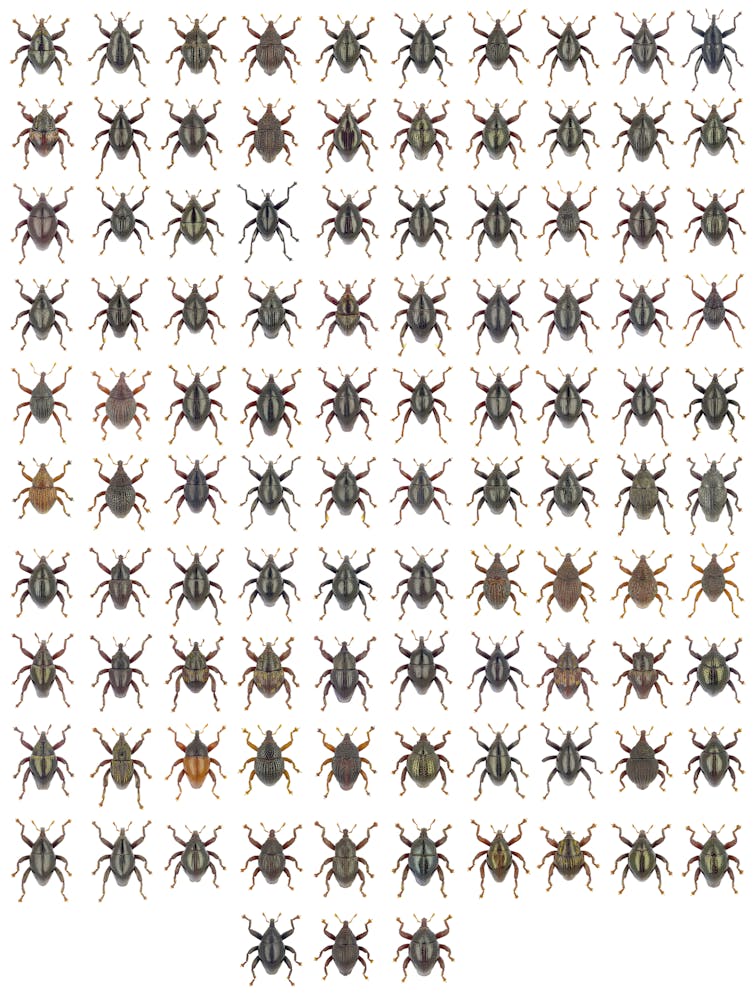Welcome Asterix, Obelix and Yoda! Finding fun in the serious matter of discovering insects
- Written by Nick Porch, Senior Lecturer in Environmental Earth Science, Deakin University
Forget the apes, we live on “The Planet of the Beetles”. Welcome.
With an estimated 387,000 formally described species, beetles (Coleoptera) are the most species-rich of the five mega-diverse groups of insects. The others are wasps, ants and bees (Hymenoptera), flies (Diptera), true bugs (Hemiptera), and butterflies and moths (Lepidoptera).
Read more: The battle against bugs: it's time to end chemical warfare
Today’s publication of 103 new species of weevils from the Indonesian island of Sulawesi is a timely reminder that, after several hundred years of research, we have not even described half of the insect diversity out there. Not even close. Especially in the tropics.
This seems particularly important in light of recent media attention on the global loss of insects (which may or not be an “insectageddon”, depending on how you look at the data).
Knowing what we have
Ideally, before we worry about what we are losing, it would be nice to know what we have.
Guesstimates of the number of beetle species on Earth suggest that only about one quarter of the species out there have been described.
Although most British species were described by the middle of the 19th century, in many parts of the world it is easy to find new species and will be for many decades, providing they hang on that long.
And it’s probably best to set aside the notion of cracking a bottle of champagne with every new species discovery. As writer Simon Barnes says, referring — in Ten Million Aliens: A Journey Through the Entire Animal Kingdom — to people who discover new species, “they’d be pissed all day”. If you work on weevils, you’d be comatose.
Welcome weevils
Alexander Riedel, a weevil specialist from Germany, and Indonesian museum curator Raden Pramesa Narakusumo are working on the Asia-Pacific weevil genus Trigonopterus.
These small weevils, mostly several millimetres long, are distributed from Samoa in the Pacific through northern Australia to Sumatra. Australian Trigonopterus (32 described species) are mainly restricted to subtropical and tropical rainforests of the east coast, north from around the Queensland/New South Wales border.
The authors’ latest paper describes 103 new species from Sulawesi (Celebes of old) including several they named after Asterix, Obelix and Idefix - principal characters in the French comic series The Adventures of Asterix.
Asterix and Obelix don’t like the Romans much.Species names are always lower-case and the genus always begins with a capital: for example “Trigonopterus asterix Riedel”, named after Asterix. Italics are used to show that we are talking about a genus and/or species name. The author or authors primarily responsible for describing the species are traditionally appended to the end of the name.
A small greenish forest-dwelling species is named after Yoda of Star Wars fame, and several others after well-known biologists including Charles Darwin, James Watson and Francis Crick (the latter two identified the structure of DNA).
 103 new weevil species from Sulawesi: can you pick the differences between them all?
Alexander Riedel
103 new weevil species from Sulawesi: can you pick the differences between them all?
Alexander Riedel
Naming is fun but hard
Naming species in novel ways is more common that you might think. Just this week one of 14 new northern Australian dung beetle species was named Lepanus sauroni Gunter & Weir, after, you guessed it, Sauron of Lord of the Rings fame. Part of the beetle’s abdomen resembles the Eye of Sauron.
Most of the new Trigonopterus (and Lepanus) species are named after the locality where they were discovered, their collector, or distinctive characters they might have.
Read more: Why so many Australian species are yet to be named
You might imagine coming up with 103 new names would be relatively easy, but it’s not that simple. There were already 341 Trigonopterus described (mostly by Riedel and colleagues), and the new names have to be different. The names for new species of this genus described in the future, and there are hundreds more, will have to be different again.
Living in Melbourne, as I do, there are plenty of undescribed invertebrate species including, of course, weevils. If you know what you are doing, many of these are abundant and easy to find. Some may represent charismatic, colourful, fascinating or old evolutionary lineages. Many of these species are known and are preserved in national or international collections awaiting description, but plenty of others are unseen and uncollected.
Who cares? And why?
A widespread lack of enthusiasm for invertebrates translates to a broader lack of knowledge and engagement, and the inevitable “who cares anyway?”.
In Wonderful Life, author Stephen Jay Gould writes:
Classifications are theories about the basis of natural order, not dull catalogues compiled only to avoid chaos.
Describing species, and revealing what is where, fundamentally underlies major fields of biology like ecology, evolution and biogeography, contributing to a deeper understanding of the complexity of life on Earth.
If we’re to prevent the loss of major parts of our biodiversity to extinction, a deeper understanding of the planet’s numerically dominant invertebrate life is critical. Fortunately, there are those like the authors of these papers who follow their passion, and back it up with a lot of highly skilled work.
Authors: Nick Porch, Senior Lecturer in Environmental Earth Science, Deakin University




